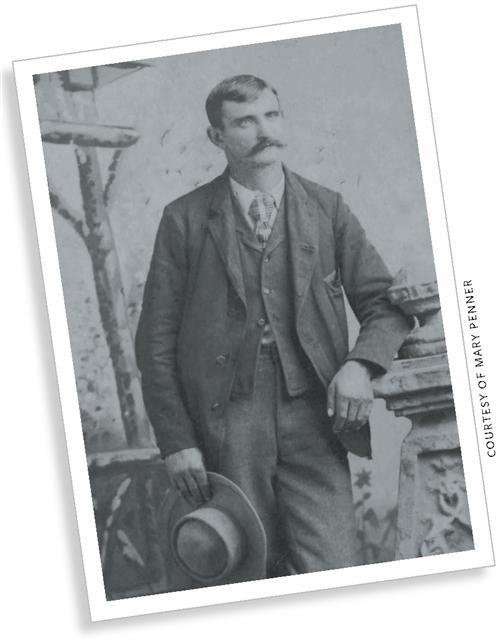Sign up for the Family Tree Newsletter Plus, you’ll receive our 10 Essential Genealogy Research Forms PDF as a special thank you!
Get Your Free Genealogy Forms
"*" indicates required fields
Untimely Passing
When my father-in-law died several years ago, my husband and I quickly packed our suitcases and flew from Alaska to Massachusetts. After the 12-hour flight, we were exhausted and still stunned, but glad to see my sister-in-law, who met us at the airport.
As she drove down the highway, she told us about burial arrangements, family members’ arrivals, church services and the other details that accompany a funeral. “There’s one more thing you need to know,” she said. Looking into my eyes, she drew a deep breath, then blurted out, “You’re dead.” Thrusting a newspaper into my hand, she told me to read Dad’s obituary. I scanned the words and saw my name, but instead of being noted as a survivor, I was listed as the “deceased first wife.”
No one quite knew how it had happened, but there it was in cold, hard print. The error created a bit of tension over the next few days, though one aunt gave me a sly wink as she took my hand and said, “You’re looking rather good. All things considered.”
Now, deep into my family tree research, I’ve encountered some dead ends and false leads. At times I’m tempted to jot down names and dates without double-checking their accuracy. Then I remember that obituary’s “factual” report of my death.
– Paula Sanders McCarron, Anchorage, Alaska
Hogwash!
In the Midwest where I grew up, clean living meant church on Sundays and no run-ins with the law except for an occasional speeding ticket (even that was discouraged because it was a silly waste of money). We still sweep contemporary lawlessness under the rug, but ancestors who ran afoul of the law are another story. After all, to a genealogist, a family criminal means something far more important than dishonor — it means a paper trail!
I was searching the 1880 US census for my great-grandfather James Boyd. Since I was fairly confident he lived in Linn County, Kan., at the time, I believed I was onto something when I found a James Boyd in Kansas with the right age and birthplace. The interesting thing, however, was the current residence: Kansas State Penitentiary.
A few months later, I was preparing to visit the Kansas State Historical Society in Topeka. The night before my long-awaited trip, I told my brother-in-law, Ken, about James and his suspicious address. Despite the intrigue of it all, I worried that he might have done something really awful. A host of distasteful possibilities ran through my mind. Ken reassured me, saying, “Oh, he probably stole some farmer’s old sow.”
The prison ledger book confirmed that the inmate James Boyd was a resident of Linn County. This certainly was my guy. The crime: grand larceny. Hmmm … that didn’t sound too bad, but it was still a little vague. A subsequent trip to the county courthouse uncovered a stash of documents related to the arrest, trial and conviction. Oh, and what did James Boyd steal? A hog!
– Mary Penner, Tijeras, NM
It Runs in the Family
Dad always enjoyed claiming there was a horse thief somewhere in his family. Eventually it became a joke — we even had a name for the thief.
Not long ago, I was on the Internet yet again chasing my father’s elusive grandparents, when I hit the mother lode. A distant cousin had posted a reference to my great-grandparents on a Web site. He sent me “a few pages” of information. And there was our horse thief, hiding in those 13 pages! The sister of a grandfather, seven generations ago, married a man who’d accrued about 10 years’ jail time for his illegal use of other folks’ horses. Even the sister was hauled before the courts of the 1700s for being a “common disturbance.” They must have been a fun couple.
I sent copies of this material to another cousin, jokingly noting that I’d found the family horse thief. He wrote back to say the thief was much closer than that: After our grandmother died delivering her eighth baby, our grandfather was deemed incapable of caring for the children. County authorities placed my 7-year-old dad and a younger brother in a home for boys. This turn of events didn’t sit well with the children. At his first opportunity, Dad helped himself to a convenient horse and high-tailed it to an older brother’s house.
My father never told us he was his own horse thief. We assume the horse was safely returned, and Dad got no other punishment other than, possibly, a trip to the woodshed.
– Sharon Edmonds, Tucson, Ariz.
Shabby Chic
In 1949, when my husband and I bought our newly built house in Miami, the trend there was brick walls and open, wood-beam ceilings. Very modern, very chic.
My mother-in-law, who had come to the United States from Russia around 1906, visited for the first time right after we moved in. She walked around, looking and looking, and then called me aside.
“Joanie,” she said quietly, “did the builders run out of money?” When I asked why she thought that, she explained that our new home, with its fashionable brick walls and beamed ceilings, looked just like the houses of the poor people in Russia.
– Joan Parker, Miami, Fla.
ADVERTISEMENT


